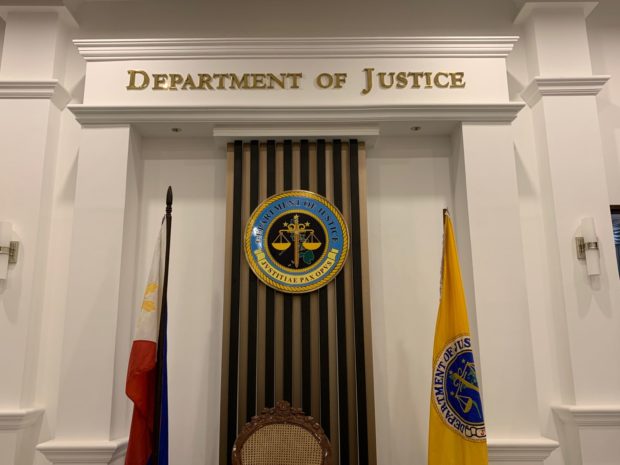
Department of Justice (DOJ)
MANILA, Philippines — The Department of Justice (DOJ) has filed charges against 10 foreigners for their alleged involvement in the trafficking of more than 1,000 foreigners who were rescued at Clark Freeport in Pampanga province early last month.
In a statement on Wednesday, Police Brig. Gen. Sidney Hernia, director of the Anti-Cybercrime Group (ACG) of the Philippine National Police, said the DOJ released a resolution on Tuesday charging the respondents—among them Chinese, Indonesian and Malaysian nationals—with violation of the Anti-Trafficking in Persons Act.
If convicted, each of the suspects would be penalized with life imprisonment and a fine ranging from P2 million to P5 million.
The respondents, whom the police did not identify, are detained in the ACG custodial facility in the PNP headquarters in Camp Crame, Quezon City, pending commitment order from the court.
On May 4, operatives of the ACG together with a composite team from different government agencies conducted a rescue operation and implemented search warrants in the six five-story buildings of Colorful and Leap Group within the premises of Clark Sun Valley Hub Corp. in Mabalacat City.
A total of 1,134 individuals—composed of Filipinos and foreigners from China, Indonesia, Malaysia, Myanmar, Nepal, Taiwan, Thailand and Vietnam—were rescued.
Police Capt. Michelle Sabino, ACG spokesperson, said the victims were recruited through online job postings, mostly on Facebook, Telegram and WhatsApp, supposedly to work as call center agents and were promised high salaries and good working conditions.
Duped
The recruiter also promised to pay for their expenses, including airfare, accommodation and work visa.
Upon arrival, however, their passports were withheld under the guise of obtaining a work visa.
After undergoing training for at least five days, they were directed to scout for foreign investors from the United States, Canada and Europe through dating apps.
The victims, most of them males, were ordered by their handlers to pretend to be attractive women on a dating site and entice their clients to invest in fake cryptocurrency.
The trafficked employees were required to work for 16 to 18 hours a day without overtime pay.
There was also a corresponding salary deduction for every violation of company policies. Worse, violators or resigning workers were locked in a “dark room” for several days and given only one meal a day.
Out of over a thousand foreign nationals, 936 had been issued with allow-departure orders by the Bureau of Immigration, Sabino said.
Of these, 150 had been repatriated as of May 30, and 140 more would be allowed to return to their home countries this week.
During a hearing on Tuesday, senators pointed out that the failure of state agencies to keep a close watch on Philippine offshore gaming operators (Pogos) had allowed syndicates to use online gaming establishments as “legal cover” for human trafficking and cybercrimes.
READ:
BI foils human trafficking attempt at Clark airport, saving two women